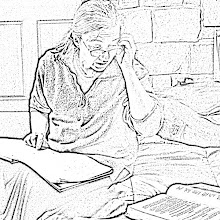Sometimes part of the challenge of teaching is coming up with assignments – assignments that aren't just busy work, but will actually teach the kids life skills. Being able to write a paper and deliver an oral report about a researched subject is a valuable life skill. I've done it many times as an adult. I dreaded public speaking all the way into my 20s; now I love it, especially if I'm talking about a subject that I'm passionate about, like missions. So after reading many biographies of missionaries, I came up with the following assigment, which I'll give the kids tomorrow:
- - - - - - - - - - - -
JACOB: Samuel Morris: Missionary to America by W. Terry Whalin
ALEXANDRA: Mary Slessor: Light for the Dark Continent by Sam Wellman
LARISSA: Gladys Aylward: For the Children of China by Sam Wellman
For this assignment, you will:
- Read a biography about a missionary.
- Write a report summarizing the interesting and important events in the missionary’s life (5 – 10 pages, double-spaced).
- Deliver a 5- to 10-minute oral report about the missionary – with notes but not reading your report – to the family at devotion time.
1. READ the assigned book by Friday, December 5.
As you read, take notes and, if you wish, use sticky notes on pages where there is important information. Jot down interesting or humorous details as you read because you will forget them! In your notes, write down important events and page numbers so you can look back at important facts when you write your report.
Example:
- David Livingstone got into trouble for reading on the job in a spinning factory, but under questioning, the supervisor saw how studious David was and that he could recite all 176 verses of Psalm 119 by heart, so he allowed David to continue reading on the job, as long as he did his work as he read. – p. 17
- Factory boys rarely knew how to read, but David not only read, he also studied Latin at night after work. David was determined not to work in a factory all his life. - p. 27
2. WRITE the report by Friday, December 12.
Write a report 5 – 10 pages long, Times Roman 12, double-spaced. Summarize the interesting and important events in the missionary’s life. Include:
- Whether the subject was raised a Christian, and if not, when/how did he become a Christian
- Any pivotal event that inspired the subject to go into missionary work
- The reason that the missionary choose the country he served in, or if he wanted to serve in one country and ended up in another, describe how that happened
- How he got there (not just means of transportation, but whether someone paid his way or he earned the money, whether through mission organization or on his own, etc.)
- What did he do in the country? Be specific and descriptive.
- What you admire about the missionary
3. GIVE AN ORAL REPORT 5 – 10 minutes long one evening during the week of December 15.
Write down bullet points that you may look at while delivering your oral report. The report should include the main information covered in the written report, but may also include additional information. Practice giving this report out loud before actually delivering the report. It must be at least 5 minutes long so you can give a lot of interesting details, but no longer than 10 minutes.








